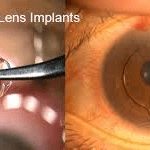As you face the challenges of blurred vision, eye lens surgery offers a transformative solution. Let’s take a closer look at what this procedure involves and how it can improve your quality of life. Eye lens surgery replaces the natural lens with an artificial one, offering a permanent solution to vision problems.
What is Eye Lens Surgery?
Eye lens surgery, also known as lens replacement, involves removing the eye’s natural lens and replacing it with an artificial one to enhance vision. Doctors most commonly perform this procedure to treat cataracts or correct vision problems such as presbyopia, nearsightedness, or farsightedness.

Why Do People Need Eye Lens Surgery?
Common Reasons for Eye Lens Surgery
People opt for eye lens surgery for several reasons, such as age-related vision changes, cataracts, or severe refractive errors.
Age-Related Vision Problems
As we age, our eyes lose flexibility, making it harder to focus on objects up close—this is called presbyopia. Lens replacement surgery can fix this issue by implanting a multifocal lens.

Correcting Cataracts
Cataracts, a common condition among older adults, cause the natural lens to become cloudy. Eye lens surgery removes the clouded lens and replaces it with a clear artificial one.
Types of Eye Lens Surgery
There are various types of eye lens surgeries, each designed to solve different issues:
Cataract Surgery
Cataract surgery removes the cloudy natural lens and replaces it with a clear intraocular lens (IOL), helping to restore sharp vision.
Refractive Lens Exchange (RLE)
RLE is ideal for people without cataracts but with severe refractive errors. It replaces the natural lens with a corrective IOL.
Clear Lens Exchange (CLE)
CLE is a subtype of RLE specifically designed for those wanting to correct presbyopia or improve vision without relying on glasses.
Phakic Intraocular Lens (IOL) Implantation
This option involves implanting an artificial lens without removing the natural lens—ideal for younger patients with severe myopia.
How to Know If You Need Eye Lens Surgery
Consult an eye specialist if you experience blurry vision, trouble reading, or cloudy eyesight. A thorough examination will help determine if lens surgery is right for you.
The Pre-Surgery Process
Comprehensive Eye Examination
Before surgery, your doctor will perform a detailed eye exam to assess your vision, eye health, and the type of lens you need.
Choosing the Right eye Lens
Different lenses cater to specific needs:
Monofocal Lenses
These correct vision at one distance—perfect for either reading or distance vision.
Multifocal Lenses
Multifocal lenses enhance vision at all distances, minimizing the need for glasses.
Toric Lenses for Astigmatism
For patients with astigmatism, toric lenses correct irregular curvature for sharper vision.
What to Expect During the Surgery
The Procedure Explained Step-by-Step
- Your eye will be numbed using drops or local anesthesia.
- A small incision is created to remove the natural lens.
- The natural lens is removed and substituted with an artificial lens.
- The incision heals naturally without stitches.
How Long Does Surgery Take?
The procedure is quick, typically lasting 15–30 minutes per eye.
Recovery After Surgery
Immediate Post-Surgery Care
- You may experience mild discomfort, which subsides in a day or two.
- Avoid rubbing your eyes and carefully follow your doctor’s instructions for a smooth recovery.
Dos and Don’ts During Recovery
Do:
- Use prescribed eye drops.
- Attend follow-up appointments.
Don’t:
- Engage in strenuous activities.
- Expose your eyes to dust or water.
Long-Term Results:
Most patients enjoy the sharper vision and reduced dependence on glasses after a smooth recovery.
Benefits of Eye Lens Surgery:
Improved Vision
Eye lens surgery restores clear, sharp vision, making daily tasks easier.
Reduced Dependence on Glasses:
With advanced lenses, you can see better at all distances without relying on corrective eyewear.
Risks and Complications of Eye Lens Surgery:
Common Risks Involved
- Infection
- Swelling
- Glare or halos
How to Minimize Risks:
Choosing an experienced surgeon and following post-surgery care reduces risks significantly.
Cost of Eye Lens Surgery:
Factors Affecting the Cost
The type of lens, the surgeon’s expertise, and the technology used all influence the cost.
Is Eye Lens Surgery Worth It?
Considering the life-changing results, it is often seen as a worthwhile investment.
Preparing for Your Eye Lens Surgery:
- Arrange transportation post-surgery.
- Follow fasting instructions if advised.
Choosing the Right Surgeon:
Look for an experienced, certified surgeon with positive patient reviews and modern facilities.
Conclusion:
Eye lens surgery is a game-changing solution for cataracts, presbyopia, and severe refractive errors. With advancements in technology, the procedure is safe, effective, and quick, offering clear vision and freedom from glasses.
Author Details:
Dr. Sushruth Appajigowda holds a prominent position as a Cornea, Cataract, Glaucoma, and LASIK Surgeon in Bangalore. He serves as the chief Cataract and Refractive surgeon at Vijaya Nethralaya Eye Hospital, Nagarbhavi Bangalore. Renowned as one of the finest LASIK surgeons nationwide, he brings with him over 12+ years of experience across multiple LASIK platforms, including ZEISS, ALCON, SCHWIND, AMO, and Bausch and Lomb. Having successfully conducted over 5000 LASIK procedures, Dr. Sushruth holds the title of a Certified Refractive Surgeon and a Fellow of the All India Collegium Of Ophthalmology. Furthermore, he stands as a distinguished speaker at various National and International Forums, using his expertise to guide you in selecting the most suitable procedure based on your health requirements.

http://vijayanethralaya.com/link-in-bio/
FAQs:
- Is eye lens surgery painful?
No, the procedure is virtually painless due to anesthesia. - How long does recovery take?
Most people recover within 1–2 weeks. - Can both eyes be treated on the same day?
Typically, surgeries are performed on one eye at a time to ensure proper healing and minimize the risk of complications. - Will I still need glasses after surgery?
With advanced lenses, many people experience complete independence from glasses. - What is the lifespan of an artificial lens?
Artificial lenses are designed to last a lifetime.











